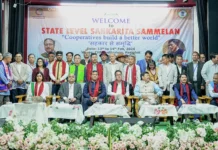[ Biswadeep Chakraborty ]
“They will break the guest house and extend the high court.”
News like this rippled through our colony, and guess what? It actually happened.
What flowers are your favourite? Roses? Daisies? Carnations? You could see numerous bouquets of these flowers wrapped in elegant varieties of paper – from vintage newspapers to glossy sheets. But have you ever seen a bougainvillea bouquet? I don’t know about others, but I personally never came across one unless it was handpicked and made into a bouquet as a conscious effort to impress somebody or make someone’s day.
‘Paper flowers’, as we called them – the muddy kutcha downhill road that led to my home would be pink; for us, it was as mesmerising as the cherry blossoms we would witness on Doraemon (a Japanese anime). A few twigs and a spread of feather-like pink flowers would cover the entire pavement with their charm. And such a sight, while returning home from the bus stop atop the hill, was truly therapeutic.
Beside the tree stood a wooden house that I would dream of peeking inside just once – you know, those two-storied wooden homes you would see in a Scandinavian countryside, situated on a vast spread of grassland? Oh, the house was exactly that. It was used for stays by VIPs from across India. My mumma always argued that it could have been preserved as an architectural relic, even for ceremonial purposes.
Soon, it all came to an end. I don’t even remember the exact timeline – when the guest house was shut down, the trees cut, and the rose-tinted pathway turned into a plain muddy road. Even though it later became a concrete pavement that stopped the waterlogging, I miss those cotton-candy shavings spread across the ground. The once-favourite place for strolls – the guest house’ compound – was closed to the public.
And now stands a huge building – the new high court. It is beautiful and extravagant, but something that could snatch away my home from me? I could never like that from the heart.
“All quarters and other homes will be broken down, and houses for the judges and staff will be made.” And news came in that the judges’ garden will be made in place of our quarters. Rumours like these spread. There was once even a notice, but it somehow got declined with the change of the deputy commissioner.
Making a judge’s garden by destroying my mom’s? How fruitful would that be? I don’t know. These plants weren’t just picked up one fine day. Every plant has a story – a story of its journey. Some are as old as the house, like the hibiscus or the curry leaf tree, and some are newer members like the monstera.
And not to mention, plants aren’t cheap. If somebody thinks, Oh, it doesn’t even have a flower, why did you buy this?, better not say that in front of my mom. I’ve never seen her so attached to jewellery or clothes. She’s very detached from those. If you ask her for some clothes or jewellery, she’ll readily lend them to you for free. But if you ask her for a plant, you’d better not pluck even a leaf without permission. We’ve been scolded for that. My cat has been scolded for that. My dad got scolded for clearing out a plant, thinking it was some wild shrub.
My mom’s favourite place is her garden, and mine – laying my head on her bicep, dhai kilo ka haath, as you’d say – more comforting than any pillow. When abo was a bachelor, he came into this house – a Type-II government quarters with just a few rooms but a reasonably large courtyard. Mumma came later, and my brother thereafter. I only saw what my home looked like earlier in photos.
Mum would tell me: the prayer hall now was initially the kitchen, and the main bedroom wasn’t there, nor was the extra living space or the study room I had in high school. In the old Kodak pictures, I could see sunflowers spread across the entrance with abo’s Splendor parked beside them. The picture of a balmy summer day would come to life – sunflowers swaying in the wind under a bright blue sky with clouds bright white.
The quarters weren’t that old, though. Quarters made before ours had wood logs joined together with cement applied between them.
“You don’t even have a permanent home here; how can you call it your state? How is it your home?”
I don’t care what others say. I’ve eaten the same food from the river, breathed the air, and shared the same jokes. How can I not? Is being indigenous only based on land? Can’t I be indigenous by heart?
Home – I don’t even know, even if I buy the most luxurious houses anywhere in the world, they’ll never feel the same as Naharlagun.
The other day, I was reading a blog and came across a word – ‘Hiraeth’. It’s a Welsh concept describing a home you can’t return to. My house won’t be mine after two years or maybe before that if they demolish it, but in my heart, it is engraved forever – each of its corners, each extra brick that my parents laid with so much hard work.
People talk about fortune and all – if there’s anything as fortune, my abo got it here in Arunachal. This state has truly blessed him. You know the concept of karmabhumi? This is his and my mom’s karmabhumi, and my janmabhumi. If there’s any unconditional love I’ve ever known, it’s the one I’ve received in Arunachal.
We lived far from relatives, so neighbours and family friends became just as close. Mumma once told me that earlier, there weren’t many places for people to hang out – no restaurants or malls – so the main form of entertainment was gathering in a friend’s house and having a great meal together. And it wasn’t like if I invited you, I’d do all the work – people would arrive early to help with chores. My parents say they’ve never felt that culture or that sense of homeliness anywhere else.
You know, there are particular challenges living as a non-tribal in Arunachal – some people may still be racist – but a lot has changed. Problems exist everywhere, and racism exists almost everywhere, at least in India. So, those people don’t matter to me and shouldn’t matter to anyone. Those who matter are those who cared for you, loved you unconditionally, shared their garden produce with you, saw you being born, stitched clothes for you, knitted sweaters for you, fed you like they would feed their children; people like those truly matter.
I love it when people give vegetables from their gardens – you don’t have to buy many things. As kids, we would hardly buy tangerines; they were always provided by an uncle who worked in Sagalee,or gifted by somebody else. I recall mumma telling me that when abo visited Sagalee, a lady – whom he had helped way back – gave him a bounty of tangerines from her garden and saw them around her orchard. Love of this kind – I don’t know where else you can find it.
My parents have spent a significant slice of their lives here, and now it feels more home than their own village. Whether sitting on the chang ghars (bamboo houses built on stilts with a compulsory kitchen cum fireplace inside) on Christmas or celebrating New Year’s Eve with bonfires and roasting chicken, whether at picnics by the riverside or being invited for dinner at someone’s place, hopping from one Durga Puja to another or catching that packet of prasad thrown from trucks during Vishwakarma Puja, receiving handmade scarves woven with perfection, or getting a bounty of veggies from someone’s garden – I love it all. It melts my heart.
In my passport, my ‘place of birth’ is ‘Itanagar’, and as long as I am alive, no one can take that from me. I might leave Arunachal someday and live in some other corner of the world, but Arunachal will always dwell within me. You can take me out of Arunachal, but you can’t take Arunachal out of me. (The contributor is a resident of D Sector, Naharlagun, and currently a third year computer science undergraduate student at IISER, Bhopal)


